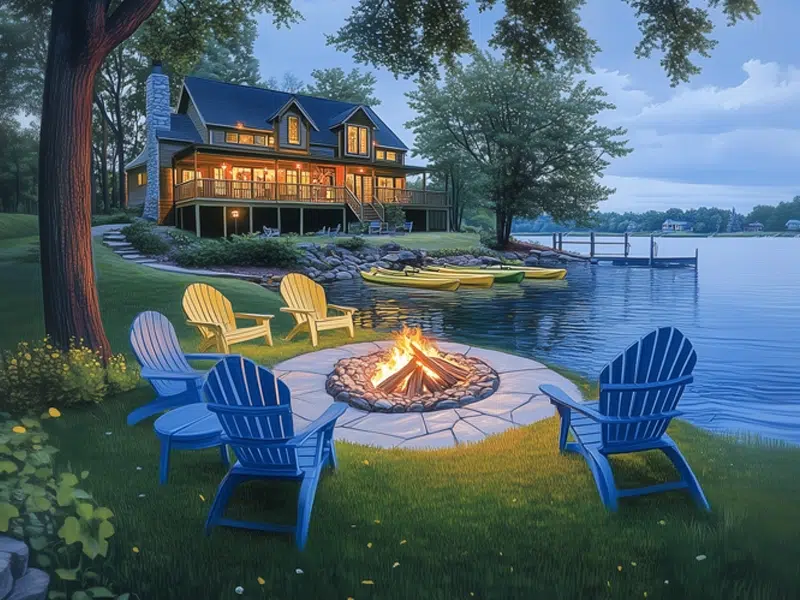STR Regulations & Maine Airbnb Laws
Did you know that within the last year, Maine has seen an increase of approximately 3,500 vacation rentals? With so many new rentals entering the market Maine understands the importance of maintaining and regulating short-term rentals, especially in cities like Kennebunkport and Freeport. STR rules and Maine Airbnb laws are constantly changing and we strive to keep our community up to date on these matters. We have outlined updated regulations that we are aware of in the state of Maine below:
If you have questions about short-term rentals in Maine, contact Proper Insurance. Our agents are experts in the vacation rental industry. Call 888-631-6680 today.

Bangor, Maine, Airbnb Laws
Requires a License and Proof of Insurance
The city of Bangor adopted short-term rentals (STR) regulations as of October 23, 2023, and every STR is now required to be registered to operate. The city also placed a cap on STRs which shall be limited to 1% of the total number of dwellings in the City of Bangor. For the most current and up to date information please visit the City of Bangor’s website.
The following regulations are in place:
- License: Must obtain a license to operate. They expire after a year and each STR owner must reapply for a license each year.
- Zoning: Ensure the unit is in an approved area and does not exceed the number of STRs allowed in a building complex.
- Max STRs per Owner: STR hosts are limited to 5 STRs per person in the city.
- Inspection: An inspection is conducted as a part of the application which includes the following, a clear address, proper storage and trash, clear exits, electrical, and fire safety.
- Insurance: The owner must hold a certificate of insurance that states that the property may be used as a short-term rental. The policy must cover property and general liability with enough to cover short-term rental liabilities that could arise.
Freeport, Maine, Short-Term Rental Rules
Airbnb Laws and Regulations
New short-term rental regulations were adopted in April 2021 by the Freeport Town Council. Freeport is one of many cities in Maine to consider new Airbnb laws, including insurance requirements and detailed operational standards for hosts. Freeport recognizes the importance of short-term rental insurance for hosts in their community. Unfortunately, like many cities across the U.S., they misunderstand the coverage Airbnb may provide to hosts. Airbnb offers a ‘guarantee’ to its hosts, but it is not an insurance policy for the home and short-term rental business. To clean more and view all of the laws for Freeport, visit the Freeport Adopted Ordinance.
The following regulations are in place:
- Point of Contact: Hosts must supply an emergency contact who can be available 24 hours a day to respond to complaints regarding the condition, safety, or operation of the dwelling unit as a rental or the conduct of guests.
- Insurance: Hosts must provide a certificate of insurance that expressly acknowledges that the property may be used for short-term rental business activity and evidencing (a) property insurance and (be) general liability insurance appropriate to cover the rental use in the aggregate of not less than $1 million. (Hosts may also provide proof that the owner conducts rental transactions through a hosting platform that provides equal or greater coverage. The owner must maintain such insurance coverage for the annual registration period.)
- Other: Hosts and renters must adhere to Freeport Loitering, Curfew, and Noise Ordinance standards. Violations of the referenced Ordinance shall be punishable by a civil penalty.
Kennebunkport, Maine, Vacation Rental Laws
Kennebunkport’s Airbnb Laws and Regulations
In June of 2021, Kennebunkport passed a new ordinance requiring every vacation rental to be licensed as of December 2021. The licenses are set to expire every calendar year on Dec. 31st and short-term rental license holders must renew annually. The goal of Kennebunkport Maine Airbnb Laws is to ensure that neighborhoods are not overly impacted by vacation rental operations.
The current regulations are in place:
- Provide: The street address and map/block/lot number of the short-term rental property.
- Point of Contact: Contact person/owner responsibility. The name of the owner of the short-term rental property and contact information, including address and telephone number. If someone other than the owner is acting as the local contact person, contact information for that person shall also be provided. Regardless of who enters the short-term rental agreement, or who may be designated as the owner’s contact person, the property owner shall be responsible for compliance with the article provisions.
- Permit Renewal: For renewal applications, licensees/owners shall be required to certify annually that they have not engaged in any transfers of the licensed premises, or been transferees in any transfers, that are not permitted transfers under § 116-4B of this article.
- More Information: For the latest on Kennebunkport Airbnb laws, visit the city’s website.
Bar Harbor, Maine, Airbnb Regulations
Vacation Rentals to Be Categorized for Safety & Compliance
Bar Harbor, Maine, enforces specific regulations for short-term rentals to ensure community safety and compliance. These rentals are categorized into Vacation Rental-1 and Vacation Rental-2, each with distinct requirements for registration, inspection, and compliance. For more information, you can visit the Bar Harbor official website.
- Stay Duration Requirements: Vacation Rental-1 rentals must be rented for less than 30 days with a minimum of 2 nights. Vacation Rental-2 properties must be rented for less than 30 days with a minimum of 4 nights.
- Licensing: Vacation Rental-1 (VR-1) applies to owner-occupied properties or rentals on the owner’s primary residence property, whereas Vacation Rental-2 (VR-2) licensing covers full dwelling units not owner-occupied.
- Safety Inspections: An inspection is required before a rental can be registered, with re-inspections mandated every three years. Properties must meet specific safety criteria, including egress windows, fire extinguishers, smoke alarms, and fuel gas detection requirements.
- Registration: All short-term rentals must be registered annually with the town, with re-registration requiring completion by May 31 each year.
- Signage: Property owners must display the issued registration card within the rental unit.
- Compliance: Non-compliance with registration or safety requirements is considered a violation under Bar Harbor’s Land Use Ordinance.
Mount Desert Tightens Laws for Maine Airbnbs
Clear Guidelines for Vacation Rentals in Mount Desert, Maine
Mount Desert, Maine, has outlined specific policies to regulate short-term rentals, ensuring both safety and compliance within the community. Properties fall into either Vacation Rental-1, for owner-occupied or primary residence rentals, or Vacation Rental-2, for non-owner-occupied units. Learn more about the City of Mount Desert’s STR laws.
- Rental Types: VR-1 rentals are classified as owner-occupied or on primary residence property; rented under 30 days, with a minimum of 2 nights. VR-2 encompasses a non-owner-occupied, entire dwelling rented under 30 days, with a minimum of 4 nights. Exemptions include hotels, motels, bed-and-breakfasts, and short-term stays under 15 days or for no compensation.
- Short-term rentals are classified as a rental of a dwelling unit or a portion thereof, used for lodging, dwelling, or sleeping purposes for fewer than 28 consecutive nights with compensation.
- Vacation rentals are classified as a residential dwelling unit or a portion thereof, rented to guests for sleeping, lodging, and dwelling purposes for fewer than 28 consecutive nights, excluding motels, hotels, boarding houses, inns, and bed-and-breakfasts
- Licensing: Short-term rental licenses are required for both VR-1 and VR-2 rentals. An annual renewal is required, managed by the Code Enforcement Officer.
- Licensing Cap: The total number of vacation rental licenses cannot exceed 9% of the town’s dwelling units, with priority given to timely renewal applicants.
- Occupancy Limits: Two guests per bedroom plus two additional guests are permitted.
- Safety Inspections: Properties must pass an inspection to register, with re-inspections every 3 years. Property must meet safety standards, such as smoke detectors, fire extinguishers, and sufficient parking.
- Advertising and Notices: Rentals without a valid license cannot be advertised. Licensed units must display license details and emergency contact information within the property.
- Transfer of Licenses: Short-term rental licenses are transferable to new owners within the same calendar year, while vacation rental licenses are not transferable.
- Compliance: Rule violation may lead to penalties; additional permits might be needed. Appeals are allowed under town ordinances.
Quote Your Short-Term Rental Today
Proper Insurance is the nation’s leading short-term vacation rental insurance provider, with the most comprehensive policy on the market. We protect homes in all 50 states with unmatched coverage for your property, revenue, and business liability, customized to include guest-caused theft/damage, liquor liability, amenity liability (bikes, kayaks, hot tub, etc.), bed bugs, squatters, and more.
Please note: The information provided is intended as a guide and may not be comprehensive or current. Regulations may change and could vary by area or situation. Always consult local authorities or a legal professional to ensure you have the most accurate information for your short-term rental property.



